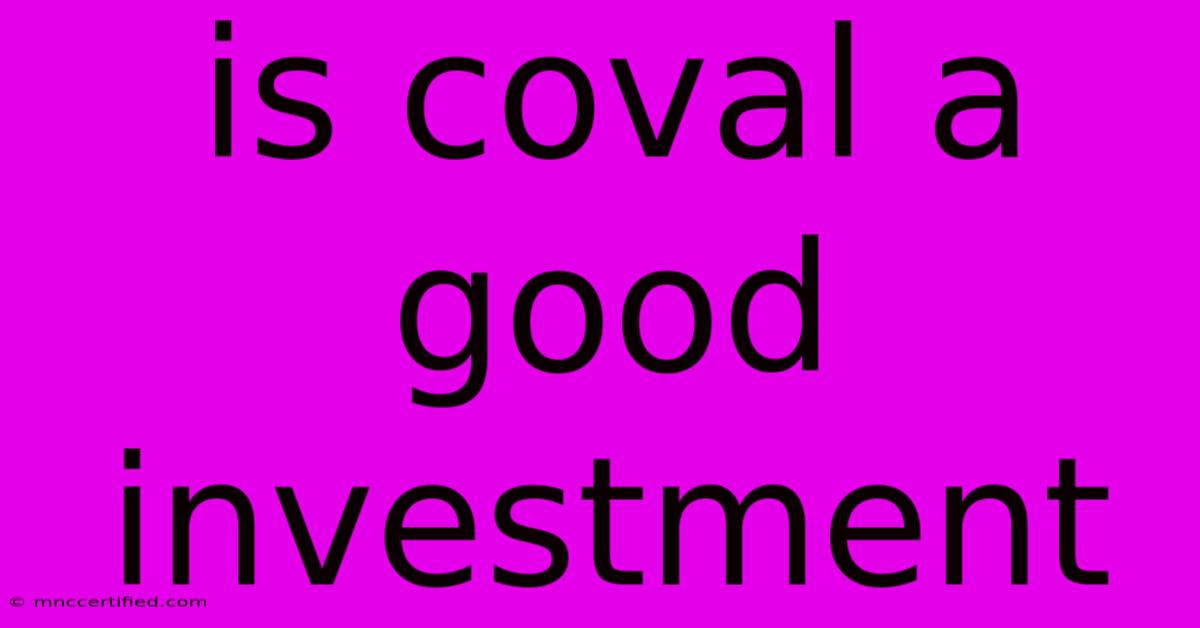Is Coval A Good Investment

Table of Contents
Is Coval a Good Investment? A Deep Dive into the Coval Platform
Coval is a relatively new player in the decentralized finance (DeFi) space, promising to revolutionize how we access and analyze on-chain data. But is it a good investment? This article will delve into Coval's offerings, its potential, and the risks involved, helping you make an informed decision.
Understanding Coval and its Mission
Coval's core function is to provide a unified API for accessing blockchain data across various networks. Imagine needing data from Ethereum, Polygon, Arbitrum, and others – traditionally, this requires navigating multiple, complex APIs. Coval simplifies this by offering a single, streamlined interface. This is crucial for developers building DeFi applications, analytics dashboards, and other blockchain-related tools. Essentially, Coval acts as a data aggregator for the decentralized world.
Key Features and Advantages:
- Unified API: Access data from multiple blockchains through a single API, significantly reducing development complexity.
- High Performance: Coval emphasizes speed and efficiency in data retrieval, crucial for real-time applications.
- Data Quality: The platform focuses on delivering accurate and reliable data, a critical factor for trust and adoption in the DeFi ecosystem.
- Developer-Friendly: Coval's API is designed to be user-friendly and well-documented, making integration easier for developers.
Coval's Potential for Growth
The potential for Coval's success hinges on several factors:
- Growing DeFi Ecosystem: The DeFi space is expanding rapidly. As more applications and protocols emerge, the demand for reliable on-chain data will only increase, benefiting Coval’s services.
- Increased Institutional Adoption: As institutional investors enter the crypto market, the need for robust data analytics tools will become even more critical. Coval is positioned to capitalize on this trend.
- Network Effects: The more developers use Coval's API, the more valuable it becomes, creating a positive feedback loop and accelerating growth.
- Token Utility: The $COVA token plays a key role in the platform's governance and incentivizes network participation. This creates potential value for token holders.
Risks Associated with Investing in Coval
While Coval presents significant opportunities, it's essential to acknowledge the risks:
- Market Volatility: The cryptocurrency market is notoriously volatile. The value of $COVA, like any cryptocurrency, can fluctuate significantly.
- Competition: The DeFi data aggregation space is becoming increasingly competitive. New players could emerge and challenge Coval's market share.
- Technological Risks: As with any technology company, Coval faces risks related to software bugs, security vulnerabilities, and scalability issues.
- Regulatory Uncertainty: The regulatory landscape for cryptocurrencies is still evolving, and changes in regulations could impact Coval's operations.
Is Coval a Good Investment for YOU?
The question of whether Coval is a good investment is ultimately subjective and depends on your individual risk tolerance and investment goals. It's crucial to conduct thorough research and consider your own financial situation before investing.
Consider these factors:
- Your Risk Tolerance: Are you comfortable with the high volatility inherent in cryptocurrency investments?
- Investment Timeline: How long are you willing to hold your investment? Long-term investments often have a better chance of weathering market fluctuations.
- Diversification: Never put all your eggs in one basket. Diversify your portfolio to mitigate risk.
Conclusion: Due Diligence is Key
Coval's innovative approach to on-chain data aggregation offers promising potential for growth. However, like any investment in the cryptocurrency space, it carries significant risks. Before investing in Coval or any other cryptocurrency, perform thorough due diligence, understand the risks involved, and only invest what you can afford to lose. This article provides information for educational purposes only and should not be considered financial advice. Always consult with a qualified financial advisor before making any investment decisions.

Thank you for visiting our website wich cover about Is Coval A Good Investment. We hope the information provided has been useful to you. Feel free to contact us if you have any questions or need further assistance. See you next time and dont miss to bookmark.
Featured Posts
-
Words With Letters Insure
Dec 10, 2024
-
Car Insurance Pearland Tx
Dec 10, 2024
-
Midnight Planet 2 Am Surprise
Dec 10, 2024
-
Jack Rice Insurance Largo
Dec 10, 2024
-
Mee Token Price Prediction
Dec 10, 2024